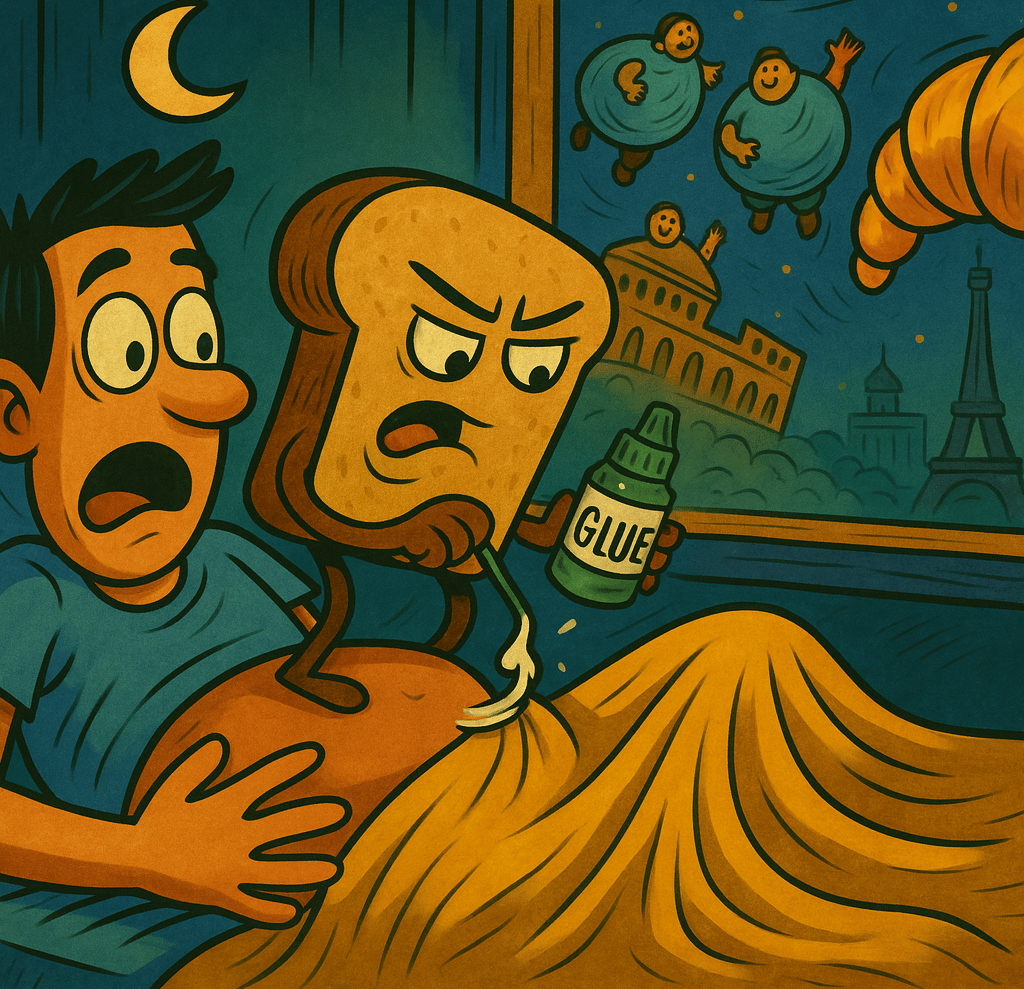Nutrition Myth #2: Carbs Make You Fat
Many believe carbs are the enemy, but science says otherwise. Learn why calories cause fat gain, how carbs fuel performance, and why balance matters more than banning bread.
NUTRITION
Adi English
3 min read


🍞 Nutrition Myth #2: “Carbs Make You Fat”
📖 Article (~320 words)
So apparently, carbs are the villains of the century. Eat a bagel, and boom — instant belly fat, right? Some people act like bread sneaks into your room at night and glues itself to your stomach while you sleep. If that were true, every Italian would be rolling through Rome like giant balloons, and France would be one massive croissant. Spoiler: that’s not reality.
Here’s the truth: carbs don’t make you fat. Eating too many calories makes you fat. Your body doesn’t keep a VIP list where fat is stored only if it comes from bread. Extra energy — whether from rice, butter, or cheesecake — gets stored as fat. Period.
Carbs are actually the body’s favorite fuel source. They give you quick energy for workouts, brainpower for studying, and help with recovery after training. When people cut carbs and lose weight, it’s not because bread has magic fat powers. It’s usually because they’re eating fewer calories overall without realizing it.
But let’s add some nuance (thanks, Andy Galpin). Not all carbs are the same. Whole grains, fruits, and vegetables bring fiber and micronutrients that give you fullness and improve health. On the other hand, highly processed carbs like soda, candy, and pastries are super easy to overeat because they taste amazing but don’t fill you up.
Carbs aren’t evil—but three bowls of pasta before bed isn’t a strategy either. It’s about balance and portions. If you love bread, keep it in your diet, just track how much of it you eat, it is easy to go overboard with delicious carbs.
Takeaway: Carbs = energy and performance. Overeating = fat gain. So stop blaming spaghetti for what extra calories did.
🗂 Vocabulary
Carbs – short for carbohydrates, nutrients that give the body energy.
Simple: Rice, bread, pasta, fruit.
Example: Athletes need carbs to perform well.
Student example: ____________
Calories – units of energy in food.
Simple: The fuel that gives your body energy.
Example: This snack has 200 calories.
Student example: ____________
Fuel source – the main supply of energy for the body.
Simple: What your body uses to run.
Example: Carbs are the body’s main fuel source.
Student example: ____________
Recovery – how your body heals and gets stronger after stress or exercise.
Simple: Rest and food that help muscles heal.
Example: Carbs help with recovery after training.
Student example: ____________
Whole grains – foods like oats, brown rice, and whole wheat that keep their natural fiber.
Simple: Brown bread, brown rice, oatmeal.
Example: Whole grains are healthier than white bread.
Student example: ____________
Fiber – plant material that helps digestion and makes you feel full.
Simple: Found in veggies, fruit, and grains.
Example: Fiber keeps you full after meals.
Student example: ____________
Micronutrients – vitamins and minerals your body needs in small amounts.
Simple: Things like vitamin C, calcium, iron.
Example: Vegetables are full of micronutrients.
Student example: ____________
Processed – food that has been changed in factories, often less healthy.
Simple: Candy, soda, chips.
Example: Processed carbs are easy to overeat.
Student example: ____________
Overeat – to eat more food than your body needs.
Simple: Eating too much.
Example: He tends to overeat when he is stressed.
Student example: ____________
Takeaway – the most important lesson or point.
Simple: The main thing to remember.
Example: The takeaway from this article is that carbs are not evil.
Student example: ____________
📝 Exercises
Comprehension
What do people wrongly believe about carbs?
What really causes fat gain?
Why do people often lose weight when they cut carbs?
What is the difference between whole grains and processed carbs?
What is the main takeaway of this article?
Multiple Choice
What is the body’s favorite fuel source?
a) Fat b) Carbs c) Protein d) Fiber
Which food is a whole grain?
a) White bread b) Brown rice c) Candy d) Soda
Why can processed carbs lead to overeating?
a) They have too many micronutrients b) They are low in fiber
c) They are slow to digest d) They make you sleepy
What helps you feel fullness?
a) Fiber b) Sugar c) Salt d) Soda
What does “takeaway” mean here?
a) A fast-food meal b) The main lesson c) A delivery order d) A type of carb
Fill in the Blank
Eating too many ______ makes you gain fat.
Carbs are the body’s main ______ source.
Oats and brown rice are examples of ______ grains.
Fruit provides important ______ like vitamin C.
Large ______ of pasta can lead to extra calories.
True/False
Carbs directly make you fat.
Cutting carbs usually reduces calories.
Processed carbs are usually high in fiber.
Carbs help with recovery after training.
The article says you should never eat bread.
Discussion
Do you think carbs are unfairly blamed in diets?
What are your favorite high-carb foods?
How can someone eat carbs without overeating?
Do you prefer whole grains or processed carbs? Why?
What is your personal takeaway from this article?
